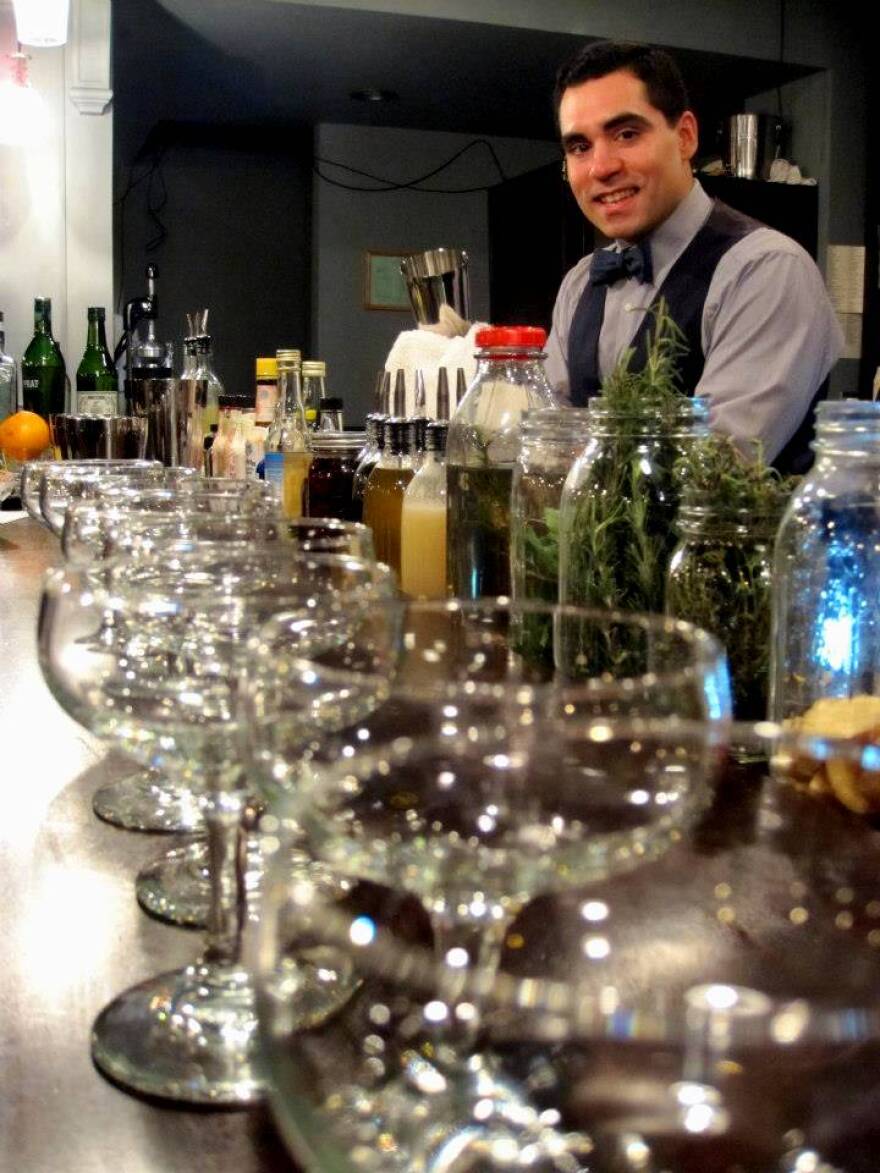My Michigan Martini (recipe by Lester Graham) 5 parts Knickerbocker gin 1 part Vya Extra Dry vermouth 1 dash Fee Brothers orange bitters Add several ice cubes to bartender's mixing glass. Add dash of bitters followed by vermouth and gin. Stir 20 - 30 times (do NOT shake). Strain into martini glass. Add twist of orange (or try a twist of lemon).
If you think about states known for distilled spirits such as bourbon and whiskey, you might think about Kentucky or Tennessee. But Michigan is becoming home to its own distilleries. That's being driven in part by a growing interest in craft cocktails.
The first thing you’re likely to notice in these craft cocktail bars is all the fruit and jars of fresh herbs such as mint and rosemary. You’re not going to find premixed bottles of corn-syrup-laden sweet and sour here. It’s all about real aromas and flavors.
Right now, there are several craft cocktail bars mostly in southeast Michigan (see some favorites at the end of this story). One of them is The Last Word where we talked with manager Robben Schulz. He says they’re always looking for new spirits to give their drinks some depth, some interest. Some of them are being made here in Michigan.
“We have the Knickerbocker from New Holland. Journeyman Distillery just opened up recently; we have their gin. We also have some of the stuff out of the distillery in Ferndale now. So, we are trying to bring in a lot of the Michigan products that are coming out in the market.”
That fits for these speak-easy-like cocktail bars looking for variety. Since prohibition, most liquor has kind of been the same.
Tammy Coxen is with Tammy’s Tastings. She teaches cocktail classes in Ann Arbor.
“Before prohibition there were hundreds of distillers all making these products and after prohibition and what that did to the distilling industry in the U.S., all that production has been concentrated in a very small number of distillers who are making basically variations of the same thing.”
With the craft cocktail movement growing and tastes changing ...
“People have started to embrace the more assertive flavors that aren’t just candy covering up alcohol and really want to appreciate the craft of fine distilling and fine cocktails,” Coxen noted.
For people who are tired of cotton-candy-flavored vodka and the bartenders who are becoming artisans of their craft, that’s great news.
A major university is helping. The Artisan Distilled Program Research Facility is a public/private operation run by Michigan State University.

Kris Berglund started this as a one-still operation making brandy 17 years ago, and today it's a state-of-the-art research facility.
“We’re the only university in the United States that has access to a commercial license.”
Which means not just research; it can produce distilled spirits.
“So, we do a lot of work with people when they’re developing their products long before they have their licenses. So work with a lot of startups like that,” Berglund explained.
That's great for distillers like J.P. Jerome. He’s with Detroit City Distillery which will be opening at the Eastern Market in early 2014. But they’re making Michigan whiskey now.
“We’re just about to put it in these barrels. And the wheat and the barley we got directly from a local farmer. So we’re trying to go very local with our ingredients. Go farm to bottle.”
Jerome says the Artisan Distilled Program Research Facility and its experts offer Michigan distillers a huge advantage.
Ari Sussman at the MSU distillery used to be a bartender involved in this craft cocktail movement.
“I actually spent a long time looking in culinary historical libraries like the Clements Library in Ann Arbor and reading about spirits that no longer exist. And, as a bartender, that’s frustrating. So I figured the best way of making these spirits available would be to make them,” Sussman said.

The MSU Artisan Distilled Program Research Facility is opening a tasting room this summer. Red Cedar Spirits will serve spirits and educate the public about the developing industry.
Back at The Last Word, Robben Schulz says new spirits from Michigan have been great for this new cocktail renaissance.
“For a bartender, seeing all these distilleries opening up is really exciting because there’s going to be a lot of new ideas, a lot of new flavors to the market. And then, as a bartender we get to be creative and try and mix a drink with that.”
That’s an idea anyone can toast.
Here are some of the popular craft cocktail bars:
The Last Word, Ann Arbor
The Sugar House, Detroit
The Ravens Club, Ann Arbor
The Oakland: Art Novelty Company, Ferndale
The Bar at 327 Braun Court, Ann Arbor



